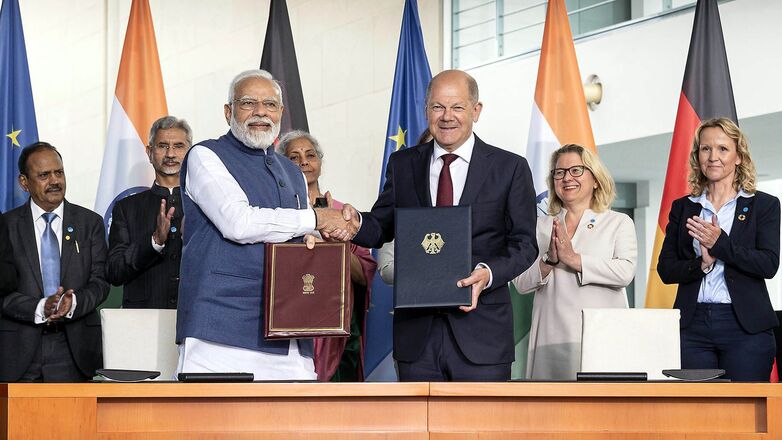Supporting the Indo-German Green and Sustainable Development Partnership
Support for the Green and Sustainable Development Partnership
-
Commissioning Party
German Federal Ministry for Economic Cooperation and Development (BMZ)
-
Country
-
Lead executing agency
More
-
Overall term
2022 to 2025
-
Products and expertise
Climate, environment, management of natural resources
Context
With a population of more than 1.4 billion, India became the world’s most populous country in 2023. However, not everyone is benefiting from the constant economic growth. While the middle and upper classes are growing, there are also more than 175 million people who have to survive on less than USD 1.90 per day.
Despite rapid expansion of renewable energy, India is the third-largest emitter of greenhouse gases in the world. As a result, the country faces the double challenge of eliminating poverty and social inequality while at the same time protecting natural resources and the climate.
Therefore, in May 2022, Federal Chancellor Olaf Scholz and Prime Minister Narendra Modi signed the German-Indian Green and Sustainable Development Partnership (GSDP), which gears cooperation between the two countries across different sectors towards the objectives of the 2030 Agenda and the Paris Agreement.
Objective
Transformative approaches to climate policy and development goals play a key role in German-Indian cooperation.

Approach
The project supports political stakeholders from both countries in implementing and deepening the partnership. In addition, it supports the Ministry of Environment, Forest and Climate Change (MoEFCC) in further developing strategies for climate change adaptation. In cooperation with the National Institution for Transforming India (NITI Aayog), the project also strives to ensure that the Sustainable Development Goals (SDGs) are mainstreamed locally.
Its core activities are as follows:
- Supporting the GSDP: This project conducts policy dialogues and strategy workshops, communicates success stories from German-Indian cooperation and prepares new partnership initiatives.
- Climate change adaptation: It provides support in drawing up a National Adaptation Plan (NAP) and promotes the development of an academic centre of excellence for climate change adaptation at the Indian Institute of Technology (IIT) in Delhi.
- Local implementation of the global development goals: In selected federal states, the project works together with coordination units for development planning, making it easier for them to gear their planning, budgeting and monitoring towards achieving the SDGs.
Last update: May 2023





